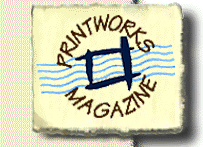During the last ten years there have been fundamental
product changes in commercial screenprinting; these de-velopments were slow to filter
through to printmakers. The introduction of water-based inks has brought a reappraisal of
working methods. This article discusses one such change, (in mesh technology); others will
follow.
With the newer water-based inks, mesh has a greater role to
play. As the solvent for the inks is water, a minimum deposit is required to prevent undue
expansion of the paper; opposed to this, most water-based inks use pigment in suspension,
thus the aim is for a heavy deposit to increase colour inten-sity. Mesh count therefore
becomes more specific to the brand of ink; and, to my knowledge, there are now 19
different inks available. The pigment in some of the cheaper brands is not as finely
ground as that in some of the more expensive brands, so will not go through the finest
meshes easily. However, some general rules apply.
Traditionally, there are two mesh thread diameter
descriptions: t and hd (t = standard, hd =
heavy duty), which are interpreted differently by each manufacturer. More recently thread
diameter measured in microns is being introduced as a standard description. So meshes are
now denoted in two ways: one a figure (number of threads per centimetre) and a letter
(diameter of thread), one a pair of figures (threads per cm and diameter in microns).
The accepted norm for all solvent- based screenprinting
inks in mesh counts was 90t for
general printing and 110-120t for
fine detail. With water- based inks use 120t (120.34) meshes for most printing, up to 150t (150.34) for fine halftones and, for a solid back-ground that needs strong
colour, 90t (90.40 or, for some
manufacturers, 90.48) but be prepared for some cock-ling or paper expansion. It is now
more important to have screens stretched tightly and evenly, 14 newtons is average for 120t screen (a newton is the Si unit of force used to
measure tension). Monofilament polyester meshes, which have replaced all other types for
most uses, come in several forms. Plain weave is fine for all printmaking uses. The newest
high modulus meshes stretched to very high tensions are too new yet for general use; twill
and calendered meshes are probably not applicable for most printmaking. The recommended
meshes combined with a very sharp squeegee and the correct amount of snap whilst printing,
reduce surface tension to a minimum, allowing a controlled quantity of ink and therefore
water onto the paper. If you use direct emulsions, it also costs far less to coat a screen
with tight mesh, as you can obtain a much thinner deposit. Orange dyed meshes (Anti
halation) stop the light from being reflected and scattered when using direct coatings and
this is important for fine detail and halftones. It is usually cheaper to have screens
stretched professionally than it is to buy the mesh and do it yourself. Alu-minium screens
are recommended as they are cheap and do not warp, thus keeping the mesh tight. Or if
working to a tight budget it is possible to buy pre-stretched wooden or MDF frames.
Suppliers of frames and meshes in Britain
The cheapest we know and which will deliver orders over £90.00 free to main-land UK:
Tic Tac Ltd, Unit 15, Lawrence Hill Industrial Park, Bristol BS5 OEB, UK Tel:+44
(0)1179541101.
Also competitively priced:
Four Way Stretch, Caroline Cottage, 1 Waterfall Road, Wimbledon, London SW19 2AG, UK. Tel:
+44(0)181 543 9084. London area only.
Both the following:
Gibbon Marler Ltd, 25 Deer Park Road, Wimbledon, London SW19 5EU, UK Tel:
+44(0)1815425265, and
Sericol Limited, Westwood Road, Broadstairs, Kent CTl0 2PA, UK Tel: +44(0)1843 872074,
have branches throughout the UK and stretch to the highest quality.
Contact: Steve Hoskins, University of the West of England,
Clanage Road, Bower Ashton, Bristol BS3 2JT, UK
Email S2-Hoski@UWE.AC.UK. or Tel: +44 (0)117
9660222 ext 4704.
 The information resource
for printmakers
The information resource
for printmakers  The information resource
for printmakers
The information resource
for printmakers